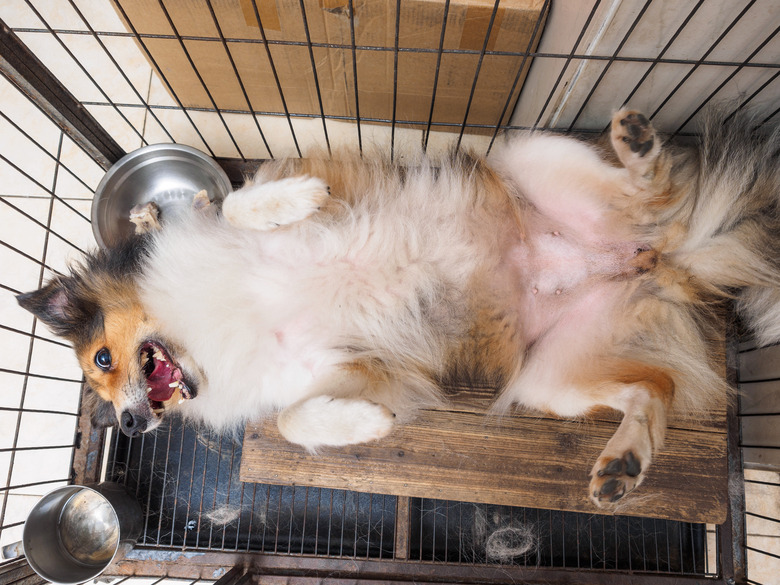Why Is My Dog's Stomach Gurgling? Harmless & Serious Causes For Stomach Noises
Largely harmless and usually not cause for alarm, a dog's gurgling stomach may make unsettling, loud noises. As in humans, the dog's tummy is simply reacting to gas moving through it into the digestive tract. However, unlike the awkwardness a human may feel when, say, their stomach makes gurgling noises during an important meeting, your pooch doesn't feel similarly embarrassed, and their stomach gurgling doesn't affect them adversely at all.
Technically known as borborygmi, a dog's stomach gurgling noises are usually not an indication of health issues and occur for various, completely normal reasons. But even if it is an inconsequential bodily function most of the time, in some cases, borborygmi can be a symptom of a serious health issue, such as inflammatory bowel disease, pancreatitis, liver disease, intestinal parasites, leaky gut syndrome, or a gastrointestinal tract obstruction.
Furthermore, if your dog's stomach gurgling is disturbingly noisy, nonstop, or at any time accompanied by an upset stomach, vomiting, diarrhea, or other clinical signs of illness, have your dog examined by your veterinarian as soon as possible.
Harmless reasons for my dog's stomach making noises
Harmless reasons for my dog's stomach making noises
If your dog's stomach is making gurgling sounds, which are typically a soft sound interspersed with periods of silence, it's often a normal reaction of the digestive system. Common causes of stomach rumbling are the following circumstances:
- If your dog's stomach is empty and they're hungry, it can make gurgling noises, a common occurrence in people too.
- If your dog eats their dog food too quickly, it may bring on a bout of stomach gurgling.
- If your dog's stomach starts making gurgling noises a bit right after eating, this indicates that the gastrointestinal tract is doing its job of breaking down food in the digestive process.
- Your dog might inhale oxygen by eating too quickly or gulping air when panting during exercise, which can result in burping and stomach gurgling.
When your dog's stomach gurgling is a health issue
When your dog's stomach gurgling is a health issue
It's important to have your veterinarian examine your dog to diagnose the underlying cause of borborygmi if their gurgling stomach is disturbingly loud, ongoing, and accompanied by any of the following gastrointestinal clinical signs:
- Vomiting
- Upset stomach
- Diarrhea
- Lack of appetite
- Drooling
- Regurgitation
Diagnostics will likely include full blood work, urinalysis, fecal evaluation, abdominal radiographs or abdominal ultrasound, a pLI to rule out pancreatitis, and specific testing to rule out underlying endocrine disease.
Abnormal reasons for stomach gurgling
Abnormal reasons for stomach gurgling
Although in most cases you won't have to worry about the occasional session of stomach gurgling in your dog, when you observe the clinical signs of illness like bloat, it could be caused by one of the following:
- Dietary indiscretions, also known as "indiscriminate snacking," means that your dog could consume rocks, string, stuffed toys, sticks, socks, bones, paper, rancid meat, and a buffet of other nonedible foreign objects. This can be at the root of loud stomach gurgling in dogs. Depending on what they ate, this may or may not be a medical emergency. They may get an upset tummy from spoiled food or a life-threatening gastrointestinal tract blockage if they ate something they can't pass. To be on the safe side, if you don't know what they consumed but are concerned they ate something toxic or ate a foreign body that could be lodged in their GI, see your veterinarian or go to an emergency veterinary hospital immediately. A blockage like this can cause serious problems like not being able to poop.
- Stomach gurgling can be caused by parasites, such as giardia, coccidia, and cryptosporidium, and also parasitic worms, like whipworms, hookworms, and tapeworms.
- Dysbiosis, commonly known as leaky gut syndrome, is caused by an overgrowth of bad bacteria and inadequate good bacteria, which inflames the membranes of the intestinal tract, often producing stomach gurgling noise.
- An underlying disease, such as inflammatory bowel disease, could be the cause of stomach gurgling.
- Pancreatitis is an inflammation of the pancreas and causes digestive enzymes to damage other organs, including the gastrointestinal system, thus the loud gurgling.
- When the liver can no longer do its job of removing toxins from the body, it becomes a serious health issue with signs that include upset stomach, vomiting, lethargy, and possibly borborygmi.
When to see a veterinarian about your dog's stomach gurgling
When to see a veterinarian about your dog's stomach gurgling
If your dog's stomach is rumbling first thing in the morning, it's generally because they're hungry and it's time for breakfast or at least a snack to hold them over if you don't generally feed them until later in the day. However, if the borborygmi is ongoing and accompanied by any clinical symptoms, you should make an appointment with your veterinarian as soon as possible to have your pooch evaluated.
The bottom line
The bottom line
While there are many common and harmless reasons your dog's stomach could be gurgling, if it happens often it is wise to rule out pancreatitis. Occasional gurgling is probably fine, but if it is happening non-stop or is accompanied by other unusual symptoms such as an upset stomach, vomiting, diarrhea, or other signs of illness, have your dog examined by your veterinarian as soon as possible.


